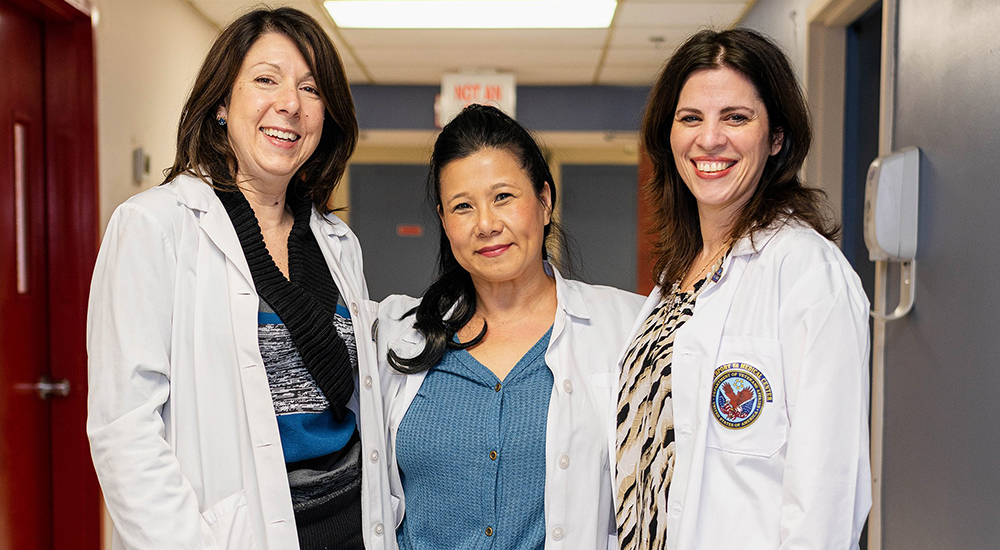In Army Veteran Daryll Martin’s home sat a collection of pill bottles intended to help him manage his rising blood pressure. Some were only vitamins. Others held prescription drugs. Most bottles were so old that the labels had worn away or fallen off, making each one nearly indistinguishable from the next.
A history of hypertension – severe enough to have landed Martin in the hospital on two separate occasions – placed Martin’s life at risk without proper medical care. Martin’s physicians questioned whether he was taking his medications routinely and whether they were even the right medications for his needs. He and his team both knew he needed to see a doctor.
But Martin suffers from narcolepsy – a chronic condition of overwhelming daytime drowsiness, with bouts of sleep that can be both sudden and involuntary. His condition makes it extremely difficult for him to drive or use public transportation.
Martin lives more than an hour away from the nearest Veterans Affairs medical center. Any attempt to reach his doctor is beset with complications and dangers unimaginable to those who do not share his condition.
A perfect candidate for telehealth
Martin was unable to get to his doctors and returned to the hospital. Then, his medical team decided to try something different. VA had developed a program specifically designed for people who face unique challenges in getting to their medical appointments. Martin seemed like the perfect candidate.
Home telehealth provides daily data monitoring for the patient and allows Veterans to remotely connect to their health care team, helping to decrease emergent care visits and hospitalizations. All from the comfort of the Veteran’s home.
Pictured above, from left, are Natalie Ruland and Jasmine Pace, telehealth care coordinators, with Alisa Tribley, telehealth program manager program manager, all at the Northport VA Medical Center.
“Telehealth lets Veterans receive care anytime, anywhere. If the patient lives far away, they can talk to their doctor from home,” said Tribley. “We try to keep the Veterans out of the hospital. The nurses monitor the patients and learn trends. If they maybe see a spike in blood pressure, they can reach out.”
Ruland further explained how this program could benefit Martin. “Our role is to operate as liaisons between the patient at home and the doctor’s office,” she said. “We oversee their care and their vital signs. We try to head off trouble before they have a problem.”
Martin knew this was an opportunity to make a meaningful impact on his health and well-being and he made the decision to enroll.
Blood pressure was down in two weeks
“I connected with Jasmine Pace. She was very concerned and I was shocked. I’ve never had anybody that concerned for me before. It felt like talking to my mom,” said Martin of his first experience with Pace. “Jasmine sent me a machine that monitored me and sent my information out. It finally got to the point where she decided to send some nurses out to see me. We got my blood pressure down in, like, two weeks. I was shocked.”
Pace called Martin daily to monitor his blood pressure and make sure he was taking his medications as prescribed. Growing concerned with his blood pressure levels, she decided to send home community nurses to check on Martin at home.
“They went through every single one of his pills and as soon as he started to take his medicines his numbers came down immediately,” Pace said.
Building a deep and trusting relationship
“Telehealth has been a tremendous help. The nurses found old medications that were expired, a lot of pills I didn’t need,” said Martin. As Martin’s physical, mental and emotional wellness began to improve, he developed a deep and trusting relationship with Pace.
“She didn’t know me but she treated me like she knew me. She made me feel a lot better about myself. I started to look at myself differently. Jasmine was like an angel that came from nowhere, how caring she was. It really meant a lot.”
VA’s home telehealth program has been transformative for Martin. Previously unable to travel even an hour away for vital hospital visits, Martin now plans to move to North Carolina. The confidence and wellness to do so is directly tied to the care and support he receives from his team at Northport VA. “As far as I’m concerned, telehealth saved my life. Telehealth stepped up. I’m very fortunate, and very grateful for them.”
Eric Guzman is a public affairs specialist for the Northport VA Medical Center.
Topics in this story
More Stories
Veteran Byron Potier weighed almost 300 pounds and was tired and lethargic. He was the perfect candidate for gastric sleeve surgery.
How much do you know about VA care, benefits and services? Don’t miss out on what you've earned—check out the "2025 VA Federal Benefits Guide for Veterans, Dependents, Survivors, and Caregivers" handbook to learn more.
Feeling stressed? Your breath can help you relax and focus. Take 3 minutes to reset and prioritize your well being for this week's #LiveWholeHealth practice.







